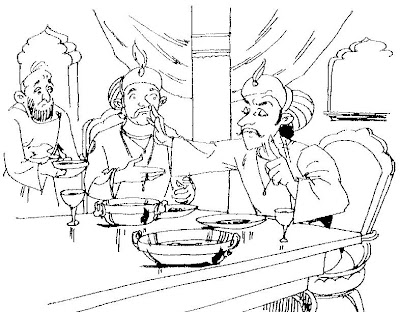In the town of Agra lived a rich businessman. But he was also a miser. Various people used to flock outside his house everyday hoping for some kind of generosity, but they always had to return home disappointed. He used to ward them off with false promises, never living up to his word.
Then one day, a poet named Raidas arrived at his house and said that he wanted to read out his poems to the rich man. As the rich man was very fond of poetry, he welcomed him with open arms.
Raidas then recited all his poems one by one. The richman was very pleased and especially so when he heard the poem that Raidas had written on him, because he had been compared with Kubera, the God of Wealth. In those days it was a custom for rich men and kings to show their appreciation through a reward or gift, as that was the only means of earning for a poor poet. So the rich man promised Raidas some gifts and asked him to come and collect them the next day. Raidas was pleased.
The next morning when the poet arrived at the house, the rich man pretended that he had never laid eyes on him before. When Raidas reminded him of his promise, he said that although Raidas was a good poet he understood very little of human nature. And that if a rich businessman like him truly wanted to reward the poet, he would have done so the very same night. Raidas had been offered a reward not because he was really pleased or impressed, but simply to encourage him.
Raidas was extremely upset, but as there was nothing that he could do, he quietly left the house. On his way home he saw Birbal riding a horse. So he stopped him and asked for his help after narrating the whole incident.
Birbal took him to his house in order to come up with a plan. After giving it some thought he asked Raidas to go to a friend's house and request the friend to plan a dinner on the coming full moon night, where the rich man would also be invited. Birbal then asked Raidas to relax and leave the rest to him.
Raidas had a trusted friend whose name was Mayadas. So he went up to him and told him the plan. The next day, Mayadas went to the rich man's house and invited him for dinner. The dinner had been planned for the coming full moon night. Mayadas said that he intended to serve his guests in vessels of gold, which the guests would get to take home after the meal. The rich man was thrilled to hear this and jumped at the offer.
After sunset on the full moon night, the rich man arrived at Mayadas house and was surprised to see no other guests there except Raidas. Anyway, they welcomed him and began a polite conversation. The rich man had come on a empty stomach and so was getting hungrier by the minute. Raidas and Mayadas were quite full, as they had eaten just before the rich man's arrival.
Finally, at midnight, the rich man could bear his hunger no longer and asked Mayadas to serve the food. Mayadas sounded extremely surprised and asked him what food he was talking about! Then rich man tried to remind him that he had been invited for dinner. At that point Raidas asked him for proof of the invitation. The rich man had no answer. Then Mayadas told him that he had just invited him to please him and had not really meant it. He then went on to say that even though they did not do anything good for other people, they also would never try to hurt another human being. He asked the rich man not to feel bad.
At that point Birbal walked into the room and reminded the rich man of the same treatment that he had himself meted out to Raidas. The rich man realised his mistake and begged for forgiveness. He said that Raidas was a good poet and had not asked him for any reward. He himself had promised to give him some gifts and then cheated him out of them. To make up for his mistake he took out the necklace that he was wearing and gifted it to Raidas. Then they all sat down to eat a healthy meal.
Raidas was all praise for Birbal and thanked him profusely. Emperor Akbar also invited Raidas to his Court and honoured him.
Management Moral: If you want to convince someone of your plight, put him in your shoes. Birbal put the rich man in the poet's position, making him experience hunger at first hand before he showed him the error. If you are a man of principles, you are bounded to consider justice as one of the important tenets in all your dealings.
By making amends at a late stage not all unpleasant consequences can be avoided, not for ourselves, and certainly not for our victims. Besides, our ways are very likely to become known to others and be a cause of embarrassment and shame.







